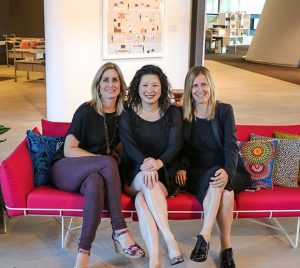
Tuesdaynights Presents: Female Entrepreneur Panel
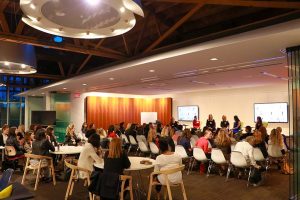
Photo Credit: Andrew Chenault
There has never been a better time to be a female entrepreneur in the US. According to Forbes, the number of women-owned companies in the country has more than doubled from 5.4 million in 1997 to more than 11.3 million in 2016. With more women than ever starting their own businesses and changing the game, Tuesdaynights has invited four outstanding female entrepreneurs to share their journey and insights with fellow female executives and entrepreneurs.
Held on May 10th, 2017 at the Herman Miller Showroom in Los Angeles, the Tuesdaynights Female Entrepreneur Panel featured Dori Howard, Co-Founder of Wade + Belle, and former Co-Founder of Milk + Honey; Sarah Penna, former Head of Awestruck and Co-Founder of Big Frame; Nanxi Liu, CEO of Enplug and CFO of Nanoly; and Shivani Siroya, CEO and Founder of TALA. Each Tuesdaynights event features a different nonprofit that has taken great strides in improving the lives of women and the community around them, and this time, we had the pleasure of hearing from Kirsten Thompson, Co-Founder and Medical Director at Groceryships.
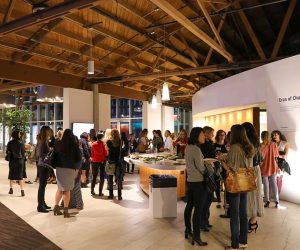
Photo Credit: Andrew Chenault
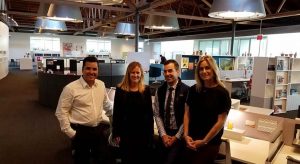
Photo Credit: Andrew Chenault
Tuesdaynights would like to thank Herman Miller for the beautiful space, the evening’s Platinum sponsor TriNet, Gold sponsor UBS Bank, food and drinks sponsor Milk Jar Cookies and Suja Juice, and DJ Patsy Palmer for the great music.
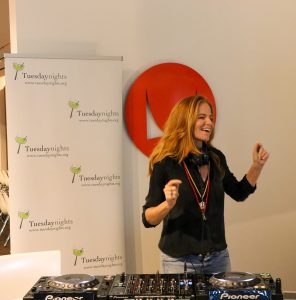
Photo Credit: Andrew Chenault
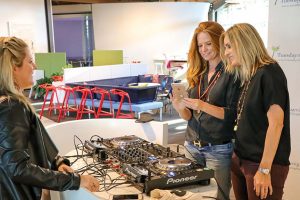
Photo Credit: Andrew Chenault
Here are the highlights from the Female Entrepreneur Panel:
How hard was it to pitch your idea at the initial stage to raise capital?
Dori shared, “It was initially very challenging to raise capital for Milk + Honey, as it [shoes] is a very female-driven product that male venture capitalists do not understand. Pitching to someone who wasn’t emotionally interested in our product was difficult, and it took a long time to raise the money that we needed.” Similarly, Sarah pointed to the venture capitalists’ lack of understanding as a factor in her difficulty in obtaining capital. When she first started Big Frame in 2011, a service talent management and influencer marketing company, most venture capitalists did not understand media very well, which made it “hard to educate them and explain what we do, especially when the venture capitalist scene in Los Angeles was not as well developed as it is today.”
On the other hand, Nanxi’s biotechnology company Nanoly received funding with relative ease. She said, “If you do something in the social entrepreneurial space, someone will fund you. We then used the funds to hire the best scientists around the world and developed the product. Then, we approached venture capitalists to raise capital, who were surprised we had the product ready, instead of being at the Research and Development phase.” Current investors of Nanoly include Dell Technologies, Intel Capital, and Duke University Medical Center.
Meanwhile, Shivani’s journey is very different from the other three entrepreneurs. She shared, “I didn’t really go out and pitch to investors – I just applied to a lot of grants and talked to everyone, telling them my story and why I wanted to start Tala. When people can relate to you emotionally, they will want to support you and give you money. My advice is to know why you’re starting the company, how much funding you need, and what you’re going to use it for.”
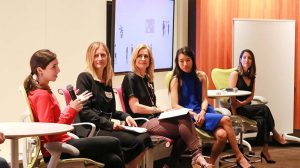
Photo Credit: Andrew Chenault
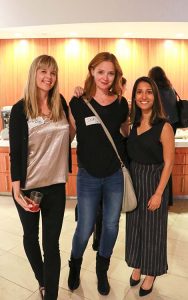
Photo Credit: Andrew Chenault
How do you balance work and leisure in your life?
“I am really into balance,” said Nanxi, “I get bored easily, so I’m always doing different things.” In her leisure time, she likes to play the piano, cello, and watch Netflix. Between her two businesses, she even has time to serve as producer on the web series The Bay, which has won five Daytime Creative Arts Emmy Awards.
For Sarah, it is about finding passions outside of her work. She is currently on the board of the nonprofit organization Groceryships, and finds it very fulfilling to give back to the community. She added, “My weekends are sacred – all 48 hours are for my son.”
Dori and Shivani both recommended taking a day off from the business and turning off your brain to get some clarity. Shivani said, “Have a day off on Saturday, and leave Sunday as the day to reflect. I would also recommend journaling as a great way to record your experiences and get the anxiety out of you.”
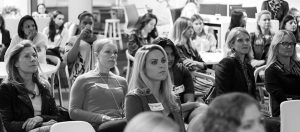
Photo Credit: Andrew Chenault
What are the things you would do differently, if you were starting a business again?
Nanxi shared, “I would have a solid hiring process. The interview process is a reflection of you and your company, and the candidates will respect you more if you have a great recruiting process… this will also ensure that the candidates will be a better fit with your company.”
Dori admitted, “I used to be a horrible people’s manager, so I would implement more structure and formality and ask for more feedback.”
For Sarah, it would be to take full advantage of the multitude of female-focused networking groups that Los Angeles has to offer. “There are many female venture capitalists in LA willing to help and support other women,” she said.
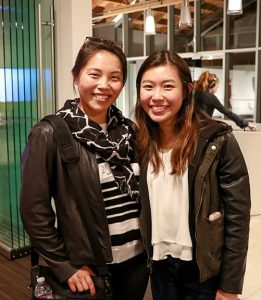
Photo Credit: Andrew Chenault
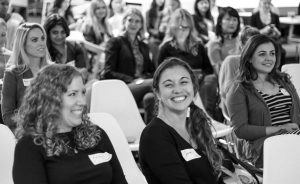
Photo Credit: Andrew Chenault
Featured Nonprofit: Groceryships
Sam Polk and his wife Kirsten Thompson founded Groceryships after watching “Forks Over Knives” and “A Place at the Table”, documentaries that jolted them into the realization that food insecurity and childhood obesity are affecting a staggering number of people in the country. Alarmed by the problems, they decided to change the food system in Los Angeles by helping low-income families by providing them with Groceryships – scholarships for groceries.
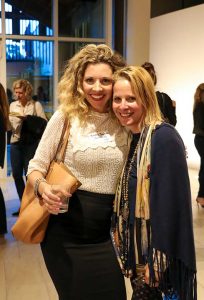
Photo Credit: Andrew Chenault
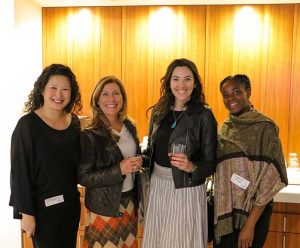
Photo Credit: Andrew Chenault
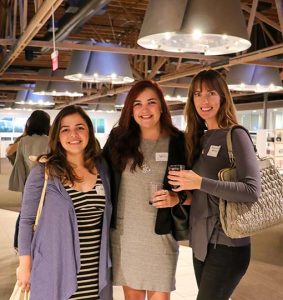
Photo Credit: Andrew Chenault
With the mission to improve the long-term health and wellness in low-income communities, Groceryships works with small groups of families through a comprehensive six-month program, in which they provide nutrition education, financial support, resources, and a community support group for each person to share their struggles and triumphs. Since its launch in 2013, Groceryships has expanded to 20 groups, serving over 400 families in Los Angeles.
